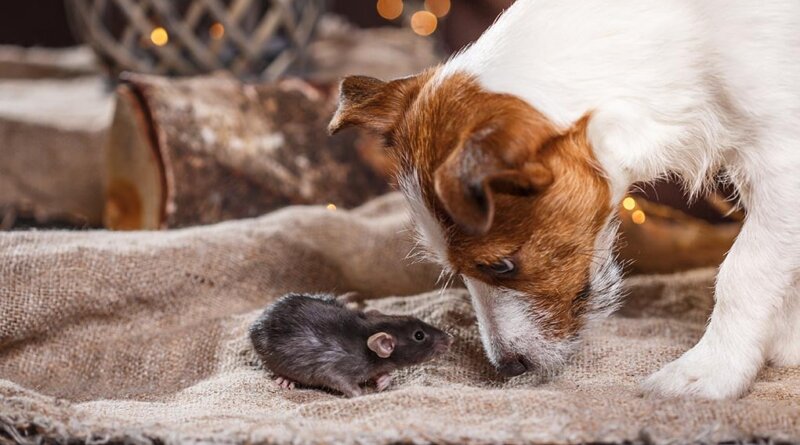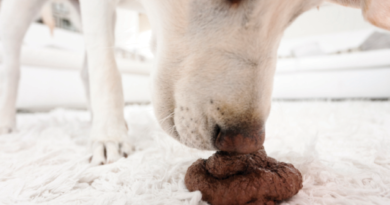What Should I Do? – Top Dog Tips
“My dog ate a rat! What should I do?”
First, let’s not panic.
Dogs can sense it when we are feeling anxious and panicky.
Some dogs have the instinct to chase and prey on small animals, and rats may be one of the common ones they see.
Allegedly, if they eat a rat, should you be concerned?
Although it’s uncommon for dogs to eat a rat, they can do so.
Some dogs have strong predatory instincts that may cause them to eat the rodent.
So what should you do?
Read more to learn what to do after your dog eats a rat.
My Dog Ate a Rat: Should I Be Concerned?
Oh no! My dog ate a rat!
You might have many questions if you’re panicking since your dog ate a rat.
Catching a mouse is a natural hobby for cats and, in some cases, dogs.
However, eating these rodents can hurt our pets.
These dangerous consequences include intestinal worms and the possibility of secondary rat bait poisoning.
Remove and Clean Any Remains
Once you see your dog chewing a rat in his mouth, removing and cleaning their mouth as fast as possible is best.
Immediately remove any remains of the rat that the dog can eat more.
Wear protective gear and carefully clean the dog’s mouth with a cloth and water mixed with salt.
Observe Your Dog for Symptoms
As pet owners, we must thoroughly check on our dogs.
If your dog has eaten a rat, observe them carefully and note any changes.
Take note if there is rat poison around the area and report it as well.
Taking notes is very helpful so that your vet can have an easier understanding of what’s happening to your pet.
Call Your Veterinarian or Local Pet Poisoning Hotline
Don’t self-prescribe medication or listen to everything you see on the internet.
Regarding health concerns about your pup, it’s best advised to call your vet.
After observing, call the veterinarian and your local pet poisoning hotline for medical assistance.
Report the dog’s condition, especially if there are any changes in behavior or in the symptoms.
Let Your Veterinarian Know If You Have Rat Bait Present in the House
If there is any rat bait in your home, mention it, as it may help deduce diagnosis and treatment.
Don’t hide any information from your vet.
The more information you give, the easier for them to determine the causes and the possible treatments for your dog.
Some rat poisons have different concentrations that may need different approaches in terms of treatment.
Bring Your Dog to the Veterinary Clinic for a thorough Check-Up.
Your veterinarian or local pet poisoning officer may advise you to bring your pet to the veterinarian for a check-up.
Following their advice as soon as possible is important, as symptoms may develop or worsen over time.
What are the risks of dogs eating rats?
Dogs who have eaten rats may be at risk of some diseases.
Owners should ask for medical assistance immediately, as some conditions may become long-term or untreatable in the long run.
Here are some diseases that may affect the dog after eating a rat.
Leptospirosis
Leptospirosis is an infection caused by the Leptospira bacteria.
It is acquired through exposure to contaminated urine or water from affected animals, especially rodents.
Leptospirosis is an infectious disease that can be transmitted easily to humans and infected animals.
Here are some symptoms of Leptospirosis in Dogs:
If you suspect your dog has leptospirosis, it’s best to seek medical attention immediately, as some symptoms may become irreparable.
Your veterinarian may also advise you to separate your infected pet from others until treated and to avoid contact with your dog’s urine, as it is contagious.
Treatment may depend on the present symptoms.
Rat Bait Poisoning
If your dog has eaten a rat that allegedly has taken the rat bait, it’s best to contact an animal center for medical attention.
Treatment and prognosis will depend on the amount of bait the rat has intake.
Here are some symptoms of Rat Bait Poisoning in Dogs:
- Bleeding in gums, nose, urine
- Diarrhea
- Fever
- Inappetance
- Incoordination
- Increased thirst and urination
- Joint Inflammation
- Lethargy
- Paralysis
- Seizures
- Vomiting
Treatment for rat bait poisoning may be through IV fluids, an antidote, or antacid medications.
This will depend on the kind of rat poison that was taken.
If owners know the kind of rat poison the rat or their dog ingested, it’s best to bring it to the veterinarian to deduce a diagnosis.
The earlier treatment is the best action to treat this as soon as possible.
Roundworms
Roundworms are nematodes or ascarid parasites that inhabit the intestine.
They can be acquired through the dog’s mother or carried by small animals, especially rodents, that are also infected with roundworms.
Here are some symptoms of Roundworms in Dogs:
- Bloated stomach
- Coughing
- Diarrhea
- Lethargy
- Weakness
- Weight loss
- Visible worms in stool
- Vomiting
Treatment for roundworms is mainly deworming.
Treatment may also include tending to the other symptoms.
Although roundworm is not fatal, prolonging the symptoms may greatly affect the dog’s health in the long run.
How to Prevent Your Dog from Eating Rats?
Rat-Proof Your Home
Although this can be extremely difficult, this is one of the best ways to prevent your dog from eating rats.
Here are some tips to start rat-proofing your home:
- Owners may start rat-proofing their homes by keeping edible materials out of reach and sealed properly.
- Any trash inside the house should be cleaned and discarded immediately.
- Don’t forget to secure the garbage bin properly, as it can attract rodents as well.
- Owners should have broken walls, vents, or small entrances repaired and plastered to keep rodents from entering the home.
- Owners can also call pest control if rodents frequently visit their homes.
Train Your Dog
Basic obedience training can also help dogs to avoid eating rats.
Commands such as ‘leave it’ or ‘drop it’ may help you reinforce directions to your dog when encountering a rat.
Owners may give treats in training to encourage the dog to follow the commands.
How to Prevent Diseases Carried by Rats?
Deworming
Dogs should be dewormed from two weeks to 12 weeks old.
They should also get annual check-ups, and follow-up deworms if needed.
If their deworming is up-to-date, they’re less likely to get worms.
Vaccination
Your dogs need to get their vaccination annually, including leptospirosis vaccination.
This vaccination is a huge help to prevent them from getting infected by the disease.
Make sure to keep their vaccination up-to-date as well!
FAQs about Dog Eating Rats
Can dogs get rabies from rat/mouse bites?
Although all mammals are susceptible to rabies, small rodents (such as chipmunks, gerbils, guinea pigs, hamsters, mice, rats, and squirrels) have a rare chance to be infected and to infect with rabies.
Can dogs get leptospirosis from eating rat poop/feces?
Rat waste (urine, fecal matter, or other discharges) carries a lot of diseases such as leptospirosis, hantavirus, salmonella, etc.
If your dog sniffs rat poop that may have been exposed to that urine, it’ll likely get leptospirosis.
What dog breeds hunt rats?
Dogs are curious animals; some have the natural instincts to hunt small animals.
A few dog breeds that typically hunt rats are:
My Dog Ate a Rat: Before You Go…
Some dogs are natural small rodent predators. Inevitably these dogs may eat the rat if given a chance.
If you’re concerned whether your dog may get an infection or disease after eating the rat, it’s best to bring them to the veterinarian after.
If you’re like most dog owners, you’ve probably had a moment of panic when you saw your dog chasing a rat.
And if your dog is very curious like mine, then you’ve probably wondered what to do after your dog ate a rat.
While it’s natural for dogs to be curious about rodents, eating a rat can be dangerous for your pet.
Rats can carry diseases such as rabies, leptospirosis, and toxoplasmosis.
Unfortunately, they can also be poisoned with rat bait, which can be fatal for dogs.
If you suspect your dog just ate a rat, contacting your vet is best advised.
Treating symptoms immediately is the best way to ensure their health is not greatly affected after consuming a rat.
RELATED ARTICLES:








